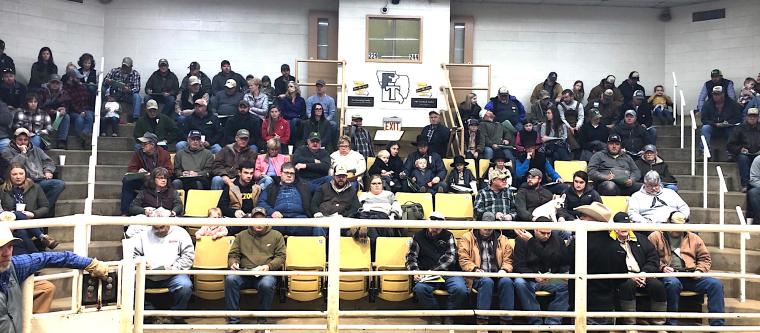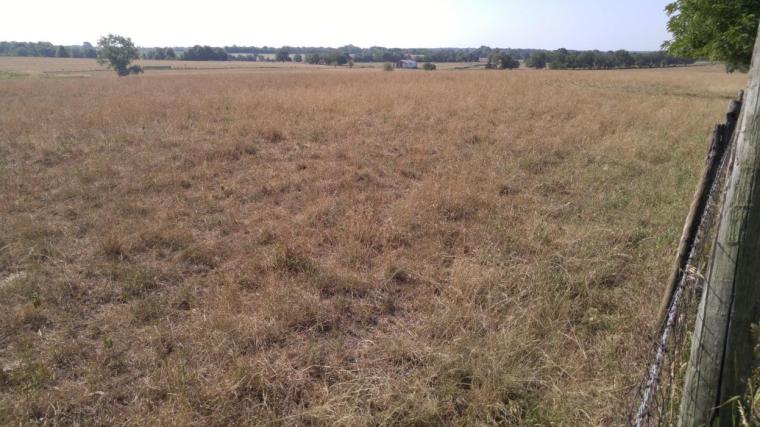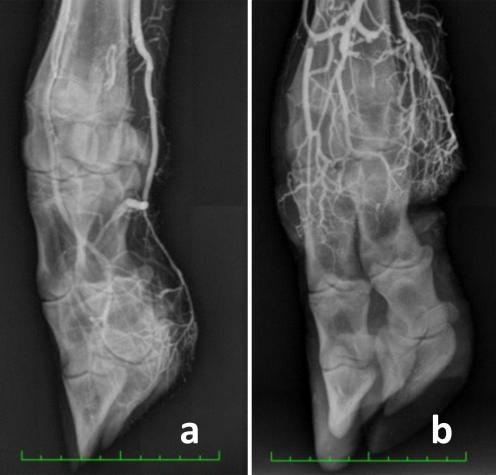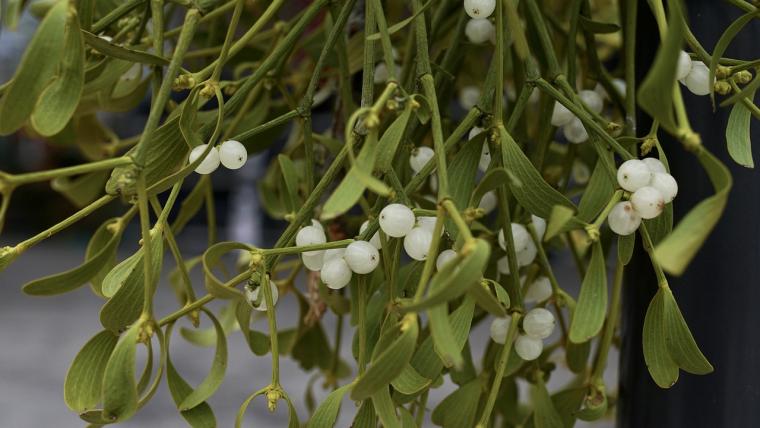
Weeds adapt to fight back against herbicides
COLUMBIA, Mo. – Weeds today aren’t like “what Mom used to make,” says University of Missouri Extension weed scientist Kevin Bradley.

Show-Me-Select heifers average more than $2,600 per head in fall sales at Fruitland
Show-Me-Select heifers averaged over $2,600 per head in Fruitland fall sales, with strong demand for top genetics.
Master Showman Competitions: Displaying Youths’ Hard Work
The Issue 4-H and FFA Livestock projects impact youth life skill development in motivation, responsibility, goal setting, discipline, and leadership (Anderson et al., 2015; Boleman et al., 2004; Evans, et al. 2019; Heavner et al., 2011; Rusk et al, 2003). Knowledge of husbandry and showing procedures increased the longer youth participate in the projects (Havner et al., 2011; Rusk et al., 2003).
MU Extension planning budgets can aid farmers
COLUMBIA, Mo. – As farms continue to see increased input costs and fluctuating returns in 2023, proper planning and decision-making will be critical for the year ahead. Updated enterprise planning budgets from University of Missouri Extension can help producers manage costs and project revenue for their operations.
MFA Foundation gift supports rural mental health resources
COLUMBIA, Mo. – Missouri farmers and ranchers increasingly struggle with mental health challenges and access to resources. The state’s rural suicide rate is growing faster than in urban counties, increasing 78% between 2003 and 2017. With a four-year grant commitment from the MFA Foundation, University of Missouri Extension will have new avenues to support rural communities in need of mental health assistance.
Boost profits by frost seeding legumes now
Frost seed legumes in cool-season pastures to boost cattle weight and profits while improving pasture health.
Marking a 100-year legacy for 7 Missouri 4-H families
Seven Missouri families are honored for a combined 100+ years of dedication and service in 4-H programs.

MFA Foundation gift supports vital rural mental health resources
As a group, Missouri farmers and ranchers increasingly struggle with mental health challenges and access to needed resources. The state’s rural suicide rate is growing faster than in urban counties, increasing 78% in 14 years between 2003 and 2017.
Beef producers: 'Get your house in order' in 2023
KIRKSVILLE, Mo. – Beef producers should approach 2023 with cautious optimism – matched with resolutions of good management and investment in infrastructure, says University of Missouri Extension agriculture business specialist Wesley Tucker.
Applications open for Missouri 4-H Foundation scholarships
COLUMBIA, Mo. – The Missouri 4-H Foundation is accepting applications for current or former Missouri 4-H members pursuing postsecondary study. Applications must be completed on or before March 1, 2023. Missouri 4-H youths are encouraged to showcase their personal growth and development as well as career goals on their scholarship applications. For details, visit muext.us/4Hscholarships.
MU Strip Trial Program sees results in foliar fungicide applications
Soybean foliar fungicide trials show average yield gains of 1.8 bushels per acre, with results varying by field conditions.
Emergency Response Is a Good Reason for Developing Relationships With Neighbors
SPRINGFIELD, Mo. -- When a disaster strikes, who are you going to call? Several residents in rural Highlandville recently answered that question with action when they reached out to their neighbors and came to help when a neighbor's home caught on fire. It all began with an effort by Echo Alexzander to meet her new rural neighbors, which turned out to be essential for an emergency response just a few weeks later.
Springfield's Tool Library a Model for Other Towns or Neighborhoods
A Springfield tool-sharing library promotes affordability, community, and sustainability—and offers a blueprint for other towns.
Lasagna Love Needs More Volunteers in Springfield Area
SPRINGFIELD, Mo. -- Nothing connects neighbors like food, and apparently, nothing says love like lasagna. Karen Harris of Springfield is the area volunteer coordinator for a neighboring movement known as Lasagna Love. Although her home is busy with the activities of her husband (retired Navy veteran) and three teenage daughters, Harris says it is not too busy to find time to use food to help others.

Winter is time to plan to beat the Summer Slump
KIRKSVILLE, Mo. – Winter is the time for livestock producers to prepare pastures for drought, says University of Missouri Extension state forage specialist Harley Naumann. Drought is now the rule rather than the exception in Missouri, Naumann says. According to the U.S. Drought Monitor, somewhere in the state experienced drought every year but one since 2000.

New center under construction for MU Extension in Monroe County
New Monroe County center is rising in Paris with federal ARPA funds, providing community services, storm shelter, outreach and education.

Fescue foot reported in Missouri cattle
Fescue foot threatens Missouri cattle during cold spells. Learn warning signs, prevention steps, and pasture solutions to protect herds.
Tips on selling your timber
Learn key steps to sell timber wisely, work with foresters, hire trained loggers, and maximize your woodland's value.
New regulations make weed management more complex in 2023
COLUMBIA, Mo. – Producers should prepare for more complexity in herbicide requirements and registrations in 2023 and beyond, says University of Missouri Extension weed scientist Kevin Bradley.The Environmental Protection Agency has proposed changes to atrazine labels that would have great impact, says Bradley. Atrazine is an effective and inexpensive herbicide used to kill broadleaf and grassy weeds in the majority of Missouri corn and…
Start the year on the right foot with your cattle record-keeping system
STOCKTON, Mo. – As the year ends, University of Missouri Extension livestock specialist Patrick Davis urges cattle producers to evaluate their record-keeping system to determine if it was successful.“Record-keeping starts with proper cattle identification,” Davis said. Two nationally known identification systems are the four-digit system and the letter and three-digit system.

2023: Year of the sparkling amaryllis
COLUMBIA, Mo. – Nothing brightens a windowsill in winter like amaryllis, the National Garden Bureau’s Bulb Plant of the Year, said University of Missouri Extension horticulturist David Trinklein. The name “amaryllis” comes from a Greek word that means “to sparkle.” And sparkle it does, said Trinklein.

Ring in the new year with black-eyed peas
Discover the tradition of eating black-eyed peas on New Year’s Day to invite luck, prosperity, and cultural meaning across time.

Missouri can lead the way to a food secure future for all
By Marshall Stewart, chief engagement officer, University of Missouri System, and MU vice chancellor for extension and engagement. In a state where agriculture is the No. 1 industry, Missouri can be a powerful leader in making sure every Missourian is food secure. At its core, food security means no child goes to bed hungry and no adult must choose between buying needed medicine and putting food on the family table.

Frankincense and myrrh: Ancient scents of the season
COLUMBIA, Mo. – Two of the three gifts of the Wise Men – frankincense and myrrh – remain in high demand more than 5,000 years after gaining popularity in religious rituals, says University of Missouri Extension horticulturist Michele Warmund. Ancient Egyptians used myrrh to embalm corpses and Romans burned it as a type of incense at funeral pyres. Ancient Egyptian, Greek and Roman societies burned frankincense or myrrh incense during…

Mistletoe: Menacing plant with an intriguing past
COLUMBIA, Mo. – Of all the plants used in holiday decor, few match mistletoe’s interesting history. And few equal its potential for harm. An evergreen plant with white berries, mistletoe is quite toxic, said David Trinklein, horticulture state specialist for University of Missouri Extension.
